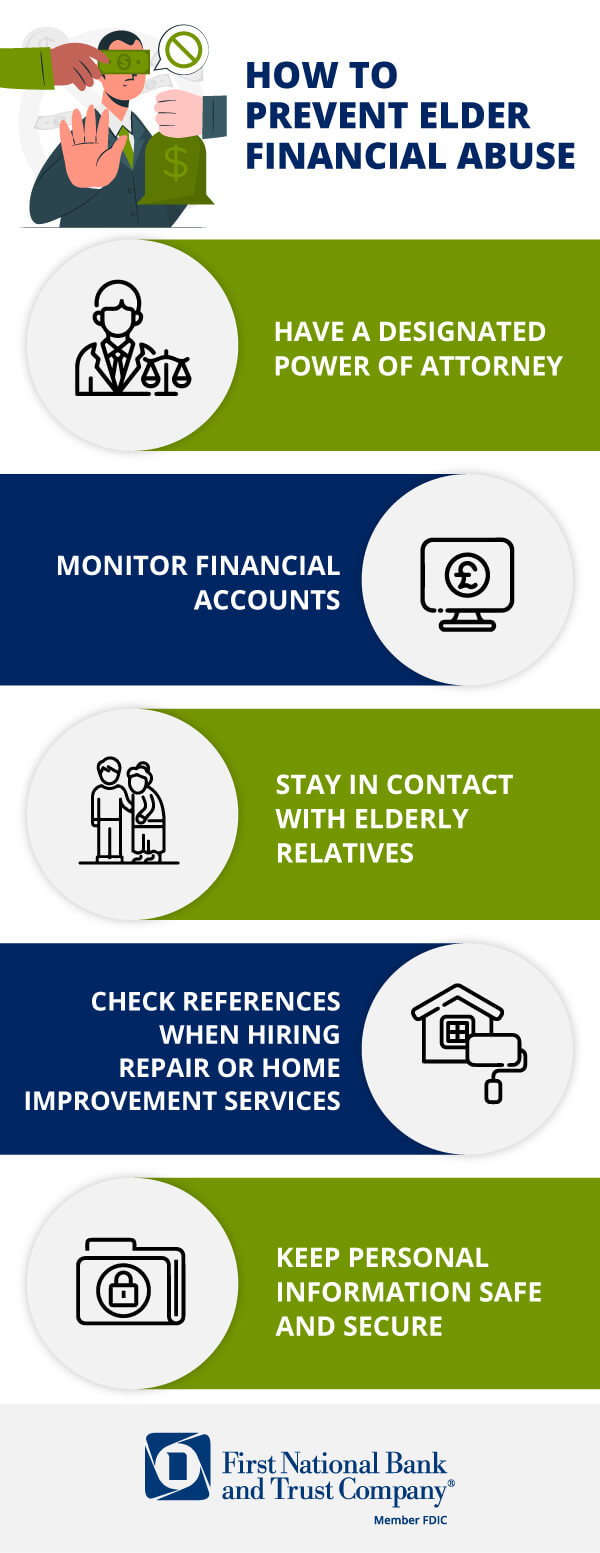How to Recognize and Prevent Elder Financial Abuse
Elder financial abuse is a serious crime where scammers exploit their resources for material gain. But there are ways to prevent elder financial fraud.

Financial scams of all kinds are on the rise, but that’s especially the case for ones impacting older individuals. More than 3.5 million older adults are victims of elder financial fraud every year, resulting in billions of dollars in losses.
Protecting yourself or your loved ones from elder scams is possible. By staying informed and taking measures to safeguard financial accounts, you could help prevent an older adult from facing financial fraud.
What is Elder Financial Abuse?
Elder abuse is a serious crime that impacts older adults, where scammers exploit their resources for some form of material gain. Elder financial abuse can include theft or fraud relating to the older person’s money or other valuable assets like their home, insurance policies, or even their line of credit.
Scammers often prey on older individuals who may rely on others due to their age or health. These criminals will gain the trust of the older adult and then try to take control of their assets, taking advantage of the relationship they have built.
How to Prevent Elder Financial Abuse
Have a Designated Power of Attorney
While older adults can still make decisions for themselves, it’s best to choose a designated power of attorney, also referred to as a POA, to act on their behalf. The POA should always be a trusted individual, as this person can make financial decisions if the senior becomes unable to do so themselves.
Choosing a power of attorney can help prevent elder abuse, as the senior is no longer managing their own financial accounts.
Monitor Financial Accounts
Anyone with access to the accounts, should continually monitor all financial accounts. Sharing usernames and passwords for online access is not recommended. Each authorized account signer should have unique login credentials to avoid cyber fraud.
Stay in Contact with Elderly Relatives
Frequent communication with older adults in the family through visits and calls can be one of the best ways to prevent elder abuse.
Scammers will often look for vulnerable seniors and take advantage of those lacking close community or family connections. They befriend and gain trust to take their money, knowing that no one else is watching.
Knowing who a senior is friends with, especially anyone new or someone who tries to isolate them from friends and family, can help stop a potential fraud situation.
What Can Seniors Do to Stay Safe?
With many banking functions now online,
cyber fraud is on the rise. One of the most common scams that older adults become victims of are
romance scams, as widows/widowers and divorcees are actively targeted by those pretending to be looking for a relationship.
It’s important to remember not to share too many personal details online, especially on public sites or social media. When talking with someone new, always look them up to see if they appear to be genuine. Most scammers will also avoid answering too many personal-based questions, so asking these can quickly identify who may be looking to commit fraud.
But elder abuse still happens in offline spaces too. When hiring help for your home, like repairs or home improvement services, always check references before letting someone come into your house.
Being proactive about security for confidential information should also be a top priority. Never give out your social security number and ask for second opinions over any significant financial decisions—this is where having a power of attorney can be beneficial. They can also look over any documents you may not understand and provide additional guidance.
When browsing the internet, be wary of online scams. Be cautious of any mysterious pop-ups that appear, especially if they request personal information that seems unnecessary. Avoid following any instructions to buy gift cards or cryptocurrency from pop-up messages. If you are unsure about something, seek a second opinion if it seems suspicious.
It’s also good to be aware of current scams that you may come across. IRS and Social Security Administration scams, where cybercriminals pose as government agencies to gain access to your information, often target seniors.
Lottery and sweepstakes scams are also prevalent. These will usually ask individuals to provide funds for customs or taxes on winnings they’ve earned but are instead a way for scammers to receive payments to overseas accounts.

How to Recognize Elder Abuse
While scammers are becoming more sophisticated in their methods, being familiar with typical bank activity and identifying suspicious transactions can stop fraud before it becomes worse. Some examples of suspicious activity include:
- Large, frequent, or unexplained withdrawals.
- Checks or payments being sent to new companies, especially as gifts or loans.
- Changing bank account types or closing accounts suddenly.
- A new individual accompanying a senior to the bank.
- Checks with suspicious handwriting.
- Unpaid bills that are continuing to accrue.
What to Do If You Suspect Financial Elder Fraud
If you’re concerned about a loved one, the best approach is to talk to them and make sure there are no misunderstandings about what’s happening with their financial situation.
If you (or they) notice anything suspicious regarding their accounts, report it to their financial institution or bank as soon as possible. Depending on the severity, it may also be necessary to report to the police.
For Wisconsin and Illinois residents, resources are available to help prevent and resolve elder abuse exploitation cases. The Illinois Department on Aging’s
Adult Protective Services program offers training and support, while the
Wisconsin Department of Health Services also has an Adult Protective Services department that can assist in cases of suspected financial fraud.
Keep Yours or Your Loved Ones Money Protected
At First National Bank and Trust, we care about our community and treat our customers like family. That’s why we want to make sure you and your accounts, or those of the seniors in your life, are safe. We continually monitor for suspicious activity and encourage you to
contact us if you see anything unusual in your own accounts.